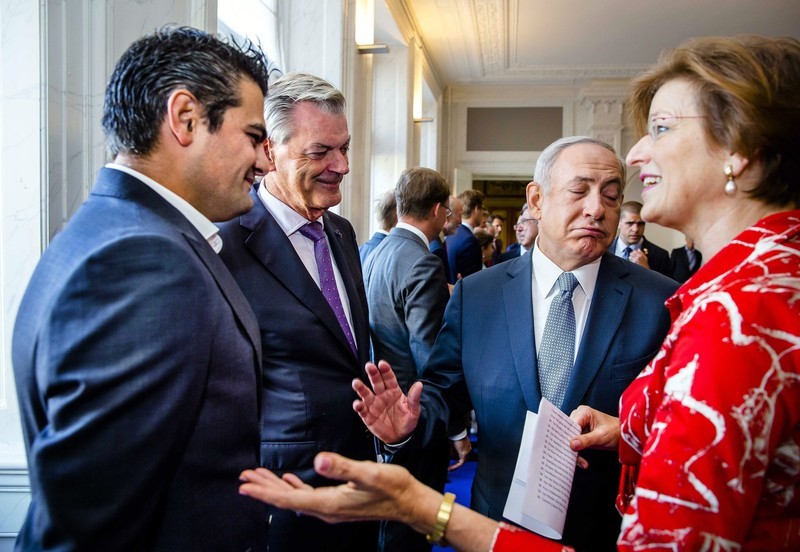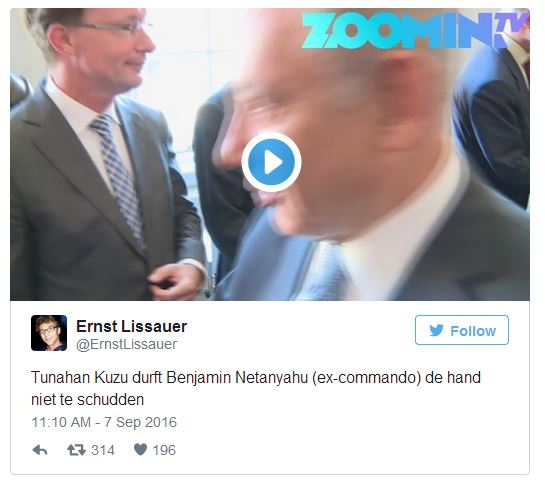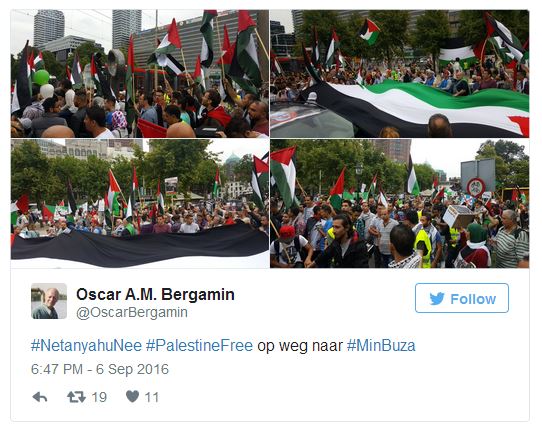Netanyahu is a war criminal, says former Dutch PM
By Adri Nieuwhof, Electronic Intifada, 9
September 2016
September 2016

Dutch lawmaker
Tunahan Kuzu, left, refuses to shake hands with Israeli Prime Minister Benjamin
Netanyahu, during a visit to parliament in The Hague, on 7 September.
Tunahan Kuzu, left, refuses to shake hands with Israeli Prime Minister Benjamin
Netanyahu, during a visit to parliament in The Hague, on 7 September.
Bart MaatEPA
The era of
“unconditional friendship” between Israel and the Netherlands is over, the
Dutch right-wing newspaper De Telegraaf reported as Benjamin
Netanyahu faced vocal protests during a two-day visit to the country this week
to discuss economic cooperation.
“unconditional friendship” between Israel and the Netherlands is over, the
Dutch right-wing newspaper De Telegraaf reported as Benjamin
Netanyahu faced vocal protests during a two-day visit to the country this week
to discuss economic cooperation.
In one striking
moment captured on video, Dutch MP Tunahan Kuzu refused to shake hands with the
Israeli prime minister during a meeting with lawmakers:
moment captured on video, Dutch MP Tunahan Kuzu refused to shake hands with the
Israeli prime minister during a meeting with lawmakers:

Palestine solidarity
groups had presented a petition to lawmakers, signed by more than 7,500 people,
urging sanctions on Israel over its “policies of oppression, discrimination,
and land grab and ignoring the United Nations.”
groups had presented a petition to lawmakers, signed by more than 7,500 people,
urging sanctions on Israel over its “policies of oppression, discrimination,
and land grab and ignoring the United Nations.”
People also took to
the streets to protest Netanyahu’s visit.
the streets to protest Netanyahu’s visit.
And more than a
thousand people wrote to lawmakers calling on them to skip the planned meeting
in parliament with Netanyahu.
thousand people wrote to lawmakers calling on them to skip the planned meeting
in parliament with Netanyahu.

Rik Grashoff, a
lawmaker for the Green Left party announced on Twitter that he would not
attend the meeting because it would not change Israel’s “disastrous policy”
towards the Palestinians.
lawmaker for the Green Left party announced on Twitter that he would not
attend the meeting because it would not change Israel’s “disastrous policy”
towards the Palestinians.
Instead, Grashoff
called for more pressure on Israel, including sanctions.
called for more pressure on Israel, including sanctions.
Kuzu, one of two MPs
from the DENK party, decided to attend the meeting to confront Netanyahu.
from the DENK party, decided to attend the meeting to confront Netanyahu.
Wearing a button with
the Palestinian flag, Kuzu nodded, but did not stretch out his hand when
Netanyahu was introduced. The Israeli prime minister appeared surprised, and said
out loud, “oh, ok,” before moving on.
the Palestinian flag, Kuzu nodded, but did not stretch out his hand when
Netanyahu was introduced. The Israeli prime minister appeared surprised, and said
out loud, “oh, ok,” before moving on.
“Propaganda”
Kuzu explained that his actions were a
response to Netanyahu’s comments during a closed-door meeting with members of
the parliament’s foreign affairs committee, which Kuzu termed “propaganda.”
response to Netanyahu’s comments during a closed-door meeting with members of
the parliament’s foreign affairs committee, which Kuzu termed “propaganda.”
Kuzu said he had
confronted Netanyahu with images of Israel’s destruction in Gaza, asking the
Israeli prime minister if this is what his promotion of democracy, technology
and security is about. Netanyahu had “no answer,” according to Kuzu.
confronted Netanyahu with images of Israel’s destruction in Gaza, asking the
Israeli prime minister if this is what his promotion of democracy, technology
and security is about. Netanyahu had “no answer,” according to Kuzu.
“While the streets of
Gaza were red with the blood of children in the summer of 2014, the red carpets
are being rolled out here,” Kuzu wrote on Facebook. “That doesn’t deserve a
handshake but a reference to #FreePalestine.”
Gaza were red with the blood of children in the summer of 2014, the red carpets
are being rolled out here,” Kuzu wrote on Facebook. “That doesn’t deserve a
handshake but a reference to #FreePalestine.”
In reaction to Kuzu’s
stance, anti-Muslim demagogue Geert Wilders called for the expulsion of Kuzu, who is
of Turkish ancestry, from parliament, accusing him of “dual loyalty.”
stance, anti-Muslim demagogue Geert Wilders called for the expulsion of Kuzu, who is
of Turkish ancestry, from parliament, accusing him of “dual loyalty.”
Wilders, who has received funding from some of the most
notorious Islamophobic sources in the US, has alsochampioned Israeli settlements in the
occupied West Bank and questioned the existence of Palestine.
notorious Islamophobic sources in the US, has alsochampioned Israeli settlements in the
occupied West Bank and questioned the existence of Palestine.
Yet other voices from
mainstream Dutch politics joined the criticism of Israel.
mainstream Dutch politics joined the criticism of Israel.
“Everybody is to
blame for the conflict except Israel,” Labor Party lawmaker Michiel Servaes
commented onTwitter.
blame for the conflict except Israel,” Labor Party lawmaker Michiel Servaes
commented onTwitter.
Prior to the meeting,
Servaes announced that he would call on Netanyahu
to “end his destructive policies of the occupation and not run away from peace
talks. Only then we can stand up for your country.”
Servaes announced that he would call on Netanyahu
to “end his destructive policies of the occupation and not run away from peace
talks. Only then we can stand up for your country.”
Harry van Bommel of
the Socialist Party tweeted that Netanyahu had cited the
existence of Belgian enclaves within the Netherlands to justify Israeli
settlements in the occupied West Bank.
the Socialist Party tweeted that Netanyahu had cited the
existence of Belgian enclaves within the Netherlands to justify Israeli
settlements in the occupied West Bank.
Netanyahu would have
been referring to tiny spots of Belgian territory that are
relics of medieval times.
been referring to tiny spots of Belgian territory that are
relics of medieval times.
There is no parallel,
however: no disagreement exists between Belgium and the Netherlands over who
the land belongs to, while Israel’s settlements in occupied territory, on land
forcibly seized from Palestinians, violate international law.
however: no disagreement exists between Belgium and the Netherlands over who
the land belongs to, while Israel’s settlements in occupied territory, on land
forcibly seized from Palestinians, violate international law.
“War criminal”
Former prime minister
of the Netherlands Dries van Agt regretted that the government of Prime
Minister Mark Rutte had rolled out the red carpet for Netanyahu.
of the Netherlands Dries van Agt regretted that the government of Prime
Minister Mark Rutte had rolled out the red carpet for Netanyahu.
Rutte’s center-right
People’s Party leads a coalition government that includes the Labor Party.
People’s Party leads a coalition government that includes the Labor Party.
Speaking on national television, van Agt
called Netanyahu a “war criminal” who should be sent for trial to the
International Criminal Court in The Hague.
called Netanyahu a “war criminal” who should be sent for trial to the
International Criminal Court in The Hague.
Meanwhile, Amnesty International used Netanyahu’s
visit to protest Israel’s use of administrative detention.
visit to protest Israel’s use of administrative detention.
Currently, more than
700 Palestinians are detained without charge or trial, a practice Israel has
retained from the era of British colonial rule in Palestine.
700 Palestinians are detained without charge or trial, a practice Israel has
retained from the era of British colonial rule in Palestine.
During a joint press
conference with Netanyahu, Prime Minister Rutte repeated his government’s position that the
boycott, divestment and sanctions (BDS) campaign is “protected under the
freedom of expression and freedom of assembly.”
conference with Netanyahu, Prime Minister Rutte repeated his government’s position that the
boycott, divestment and sanctions (BDS) campaign is “protected under the
freedom of expression and freedom of assembly.”
While supporting the
right to boycott Israel, Rutte has declared that his government opposes BDS.
right to boycott Israel, Rutte has declared that his government opposes BDS.
Rutte’s remark
suggests that Netanyahu tried again to push for delegitimizing the BDS
movement.
suggests that Netanyahu tried again to push for delegitimizing the BDS
movement.
“Settlement building
needs to stop, and so do demolitions and incitement,” Rutte said.
needs to stop, and so do demolitions and incitement,” Rutte said.
Despite such
criticism, economic cooperation between the Netherlands and Israel continues as
usual.
criticism, economic cooperation between the Netherlands and Israel continues as
usual.
But as this week
showed, the close relationship between the two countries is clearly facing
growing resistance.
showed, the close relationship between the two countries is clearly facing
growing resistance.


